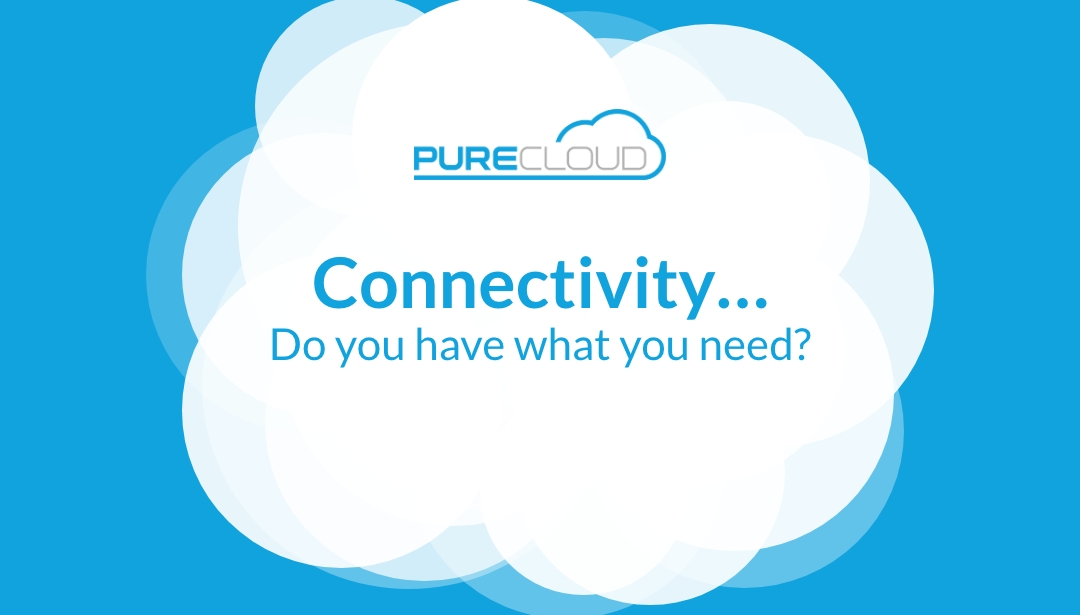Connectivity… do you have what you need?
Connectivity. It’s essential for any modern business. It allows employees to communicate with clients and colleagues, access the internet, and use various online tools and resources to complete their work. Whether you’re moving office, looking to improve your bandwidth or just want to make sure you’re not overpaying, we know there’s a lot of questions to answer. At Pure Cloud, we care about making sure you’re in the know.
We’ll take you through every step to establish reliable connectivity for your business. It’s important to understand these steps in order to make informed decisions about the best solutions for your company.

Why do I need a business connectivity solution?
These days, nearly all of us use the internet and cloud-based services to complete tasks at work. Therefore, staying connected to the internet is essential to be able to function properly as a business. If a business can perform at maximum productivity due to reliable and super-fast internet, it’s worth considering an upgrade. If your internet goes down for an extended period of time, you’ll lose productivity, staff morale and revenue.
As a business, you’ll likely already be using video conferencing, instant messaging and other internet-based tools to operate. All of these features of communication need a good internet connection and benefit from higher speeds and bandwidth. Choosing a reliable internet provider also means that you’ll minimise downtime from using these features. You don’t want to miss an important client call due to an outage!
Assessing your business needs
The first step in establishing a connectivity solution is to assess the needs of your business. You should ask yourself, how many employees will need access? What type of work will they be doing? Which tools and resources will they need to do their jobs effectively?
Depending on your location and each of the variables above, your decision for your internet connection might be affected. You’ll need to make a decision on what type of connection to go with, (fibre, cable, etc.). A larger team and premises will likely require higher bandwidth, speed and potentially additional features.
It’s also important to consider any future growth plans and how your internet service will support those plans. You may want to give yourself the option to upgrade in future if your business decides to expand.
Different types of broadband connections
FTTP
This stands for fibre to the premises. This type of broadband uses fibre optic cables that are routed directly to your site. This is one of the fastest connections you can use, capable of reaching speeds up to 900mbps. Larger sites requiring instant loading times and calling speeds may consider this as an option.
SoGEA
Single order generic ethernet access is a broadband service which delivers the same performance and data levels as traditional Fibre to the Cabinet (FTTC) lines. However, it takes away the need for the installation of a traditional phone line. SoGEA lines are reliable, minimise downtime and offer speeds of up to 80mbps.
Leased Lines
Some businesses that need an ultra-fast connection and zero downtime can benefit from using superior leased line connections. These powerful connections are dedicated lines that are tailored and routed directly to your business.
Establishing internet connectivity
Not every business needs an ultra-fast fibre connection, but larger businesses will certainly need internet with good speed and bandwidth. Additionally, if your business intends to primarily operate using internet-based tools and phones, again, you’ll need something robust and reliable.
You also want to keep costs down as a business and not get tied into an expensive contract that wastes your time and money. Unlike going directly to an internet provider, we’re here to help you get the best deal that’s right for your business’ needs. Once you’ve got your internet down, you’ve got a backbone for your business operations.
Considering the BT switch off
BT are doing something that might affect your choice in what broadband to choose. By 2025, they aim to have all of the legacy copper landlines switched off across the UK. They are doing this region by region, and it’s become a routine process of switching businesses and residents from using analogue lines to fibre.
Essentially after the Openreach switch-off, most non-fibre optic broadband connections will be defunct. We don’t want anyone to get caught out. 2025 isn’t so far away now.
Fibre of course offers higher speeds, and the 5G revolution is also on its way. Moving with the tides means you are investing in a better technology as well as a scalable and futureproof one. We understand that it’s a toss-up between what you really need as a business and how much money to invest.
Choosing a connectivity plan with Pure Cloud Solutions
We’ve been helping our clients with communications and connectivity for over thirty years. Whether you’re a new or older customer, we are dedicated to helping you find the ideal solution for your business. We’ll treat your business the same way we would treat our own. Rather than giving you a ‘one size fits all’ product package, we are here to provide a bespoke, tailored solution that can help you maximise your potential.




Recent Comments